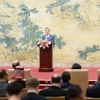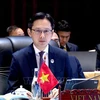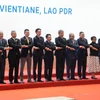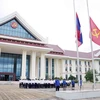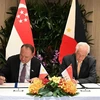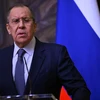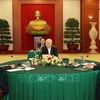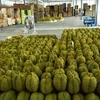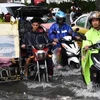The 26th APEC Foreign and Economic Ministerial Meeting concluded on November 8 in Beijing , adopting a joint statement and eight documents aiming to enhance regional cooperation in various fields.
The documents allow Asia-Pacific economies to boost trade and investment in green and renewable energy, customs, infrastructure building, maritime affiliation and corruption prevention.
During the two-day meeting, the ministers heard a report on the implementation of the World Trade Organisation’s Bali Package, and reviewed APEC’s operations in 2014.
They held that rising challenges are posing to development and connectivity in the region as growth speed slows down, Doha negotiation is sluggish, as well as peace and stability are challenged in many areas.
They agreed on the need to increase APEC contributions to the promotion of multilateral trade system, regional economic links and connectivity, economic reform and growth.
APEC should take a leading role in speeding up the implementation of Bali decisions, the post-Bali action programme and the information technology agreement (ITA), they said.
The ministers reached the consensus on accelerating the implementation of Bogor Goals on the facilitation and liberalisation of trade and investment, and supporting member economies in their economic reform and growth maintenance.
They also underscored the importance of the establishment of a Free Trade Area of the Asia-Pacific and concurred to submit to APEC leaders a formation roadmap.
Addressing the event, Vietnamese Deputy Prime Minister and Foreign Minister Pham Binh Minh highlighted regional cooperation and connectivity as the key trend in the context of complicated regional and international developments.
APEC should continue efforts to reinforce mutual understanding and trust, while raising its responsibility for common concerns and interests, ensuring the win-win principle and creating a favourable environment for cooperation, linkage and development in the region, he said.
He also proposed APEC expand regional partnerships and connections and promote its role in building a sustainable and transparent regional structure for the common goal of peace, stability and prosperity, as well as the legitimate interests of member economies.
On the sidelines of the event, which aimed to complete preparations for the 22nd APEC Economic Leaders’ Meeting on November 10-11, Deputy PM Minh had bilateral meetings with heads of delegations from APEC economies to discuss ways to boost bilateral partnership and increase coordination at the APEC forum and other multilateral cooperation mechanisms.
APEC (Asia-Pacific Economic Cooperation) was founded in 1989 and has 21 members, namely Australia, Brunei, Canada, Chile, China, Hong Kong (China), Indonesia, Japan, the Republic of Korea, Malaysia, Mexico, New Zealand, Papua New Guinea, Peru, the Philippines, Russia, Singapore, Taiwan (China), Thailand, the US and Vietnam.
Representing approximately 40 percent of the world’s population, 55 percent of global economic output and 44 percent of total trade, APEC aims to boost sustainable economic growth built on the three pillars of trade and investment liberalisation, business facilitation, and economic-technological cooperation.-VNA
The documents allow Asia-Pacific economies to boost trade and investment in green and renewable energy, customs, infrastructure building, maritime affiliation and corruption prevention.
During the two-day meeting, the ministers heard a report on the implementation of the World Trade Organisation’s Bali Package, and reviewed APEC’s operations in 2014.
They held that rising challenges are posing to development and connectivity in the region as growth speed slows down, Doha negotiation is sluggish, as well as peace and stability are challenged in many areas.
They agreed on the need to increase APEC contributions to the promotion of multilateral trade system, regional economic links and connectivity, economic reform and growth.
APEC should take a leading role in speeding up the implementation of Bali decisions, the post-Bali action programme and the information technology agreement (ITA), they said.
The ministers reached the consensus on accelerating the implementation of Bogor Goals on the facilitation and liberalisation of trade and investment, and supporting member economies in their economic reform and growth maintenance.
They also underscored the importance of the establishment of a Free Trade Area of the Asia-Pacific and concurred to submit to APEC leaders a formation roadmap.
Addressing the event, Vietnamese Deputy Prime Minister and Foreign Minister Pham Binh Minh highlighted regional cooperation and connectivity as the key trend in the context of complicated regional and international developments.
APEC should continue efforts to reinforce mutual understanding and trust, while raising its responsibility for common concerns and interests, ensuring the win-win principle and creating a favourable environment for cooperation, linkage and development in the region, he said.
He also proposed APEC expand regional partnerships and connections and promote its role in building a sustainable and transparent regional structure for the common goal of peace, stability and prosperity, as well as the legitimate interests of member economies.
On the sidelines of the event, which aimed to complete preparations for the 22nd APEC Economic Leaders’ Meeting on November 10-11, Deputy PM Minh had bilateral meetings with heads of delegations from APEC economies to discuss ways to boost bilateral partnership and increase coordination at the APEC forum and other multilateral cooperation mechanisms.
APEC (Asia-Pacific Economic Cooperation) was founded in 1989 and has 21 members, namely Australia, Brunei, Canada, Chile, China, Hong Kong (China), Indonesia, Japan, the Republic of Korea, Malaysia, Mexico, New Zealand, Papua New Guinea, Peru, the Philippines, Russia, Singapore, Taiwan (China), Thailand, the US and Vietnam.
Representing approximately 40 percent of the world’s population, 55 percent of global economic output and 44 percent of total trade, APEC aims to boost sustainable economic growth built on the three pillars of trade and investment liberalisation, business facilitation, and economic-technological cooperation.-VNA

